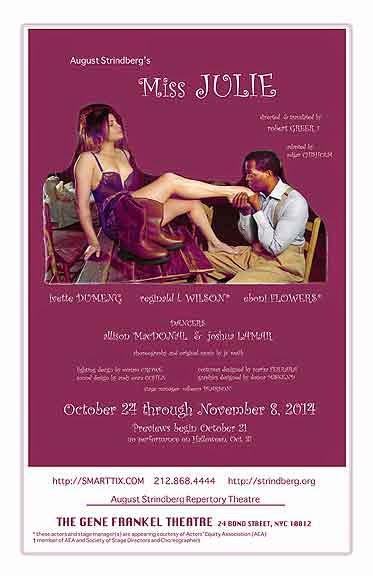DM: When did you start directing?
RG: I studied directing at Emerson College in Boston and began directing Equity casts while still in grad school at CUNY and Columbia, where I kept directing professional casts after finishing my Swedish studies in the early 90s. I’ve belonged to the Stage Directors and Choregraphers Society since 1998.
DM: What is your approach to directing your actors?
RG: I was taught that the first three rules of directing are:
choose the right play
choose the right cast
stay out of their way
To which I would add one more between rules ii and iii - choose the right ground plan
DM: What drew you to Strindberg?
RG: I bought a paperback collection of his one-act plays less than a week after graduating college and was so struck by his often brutal honesty that I read them all in one sitting.
DM: What do you think people should know about Strindberg and his work?
RG: Strindberg is simply the most important writer since Shakespeare and not merely for his plays. He would be still more famous as a novelist had he never written any drama, a fact that is not true of any of his more famous contemporaries.
DM: Strindberg’s work was written in the 19th century Sweden and takes place in that era as well. Your production of Playing with Fire was set in 1920s Martha’s Vineyard in an affluent African American community and played with an all African-American cast. Talk about why you decided to go in that direction.
RG: The class structure of XIX-century Sweden is even more remote to Americans than the British, to which they’ve had some exposure by way of the BBC’s excellent programming. A direct parallel in American society is the division between the races. I try to make one adjustment, however major, to a script and allow every other choice follow as a consequence of that one change.
DM: Are you hoping to engage a new audience of theater goers by having some Strindberg productions set in more contemporary times and using casts that reflect the diversity of cultures here in New York?
RG: Absolutely! There is no reason to set productions of his plays in a foreign land – Sweden – nor necessarily in the time at which they were written. When they were originally performed the action took place in the present. That doesn’t mean they have to be played in the New York of 2014, rather that thought must be given to the when and where.
DM: I’d like to touch on another interest of yours. How does ballet figure into your life?
RG: Until the Strindberg Rep began taking all my waking hours, I wrote about New York City Ballet – and some other – on Wikipedia. I’d been keeping programs and my personal notations and decided to keep them in public instead of in private. Very few people write about ballet on Wikipedia and City Ballet has an enormous repertory, so there was a lot to do.
 |
| Donna Miskend |
RG: Casper is a puppet play written to be performed by living actors. The connection between dance and mime and puppetry spans cultures and centuries. In European culture, the tie between ballet and mime is particularly tight, so using ballet dancers to play the puppets was a small step.
DM: To Damascus will be performed in 3 parts, beginning with To Damascus Part One this season. Why are you telling it in 3 parts?
RG: To Damascus is a trilogy which has not been performed complete in 99 years and never done without major cuts in English. Each part is a full-length play and deserves to be rehearsed and presented as such, not turned into a club-sandwich.
 |
| Donna Miskend 2014 |
RG: To Damascus is a trilogy which has not been performed complete in 99 years and never done without major cuts in English. Each part is a full-length play and deserves to be rehearsed and presented as such, not turned into a club-sandwich.
DM: What is your next production?
RG: Miss Julie, set in Louisiana in the year it was written, with a mixed-race cast. We will have ballet dancers again as the farmhands who drunkenly storm the mansion’s kitchen, something Strindberg wrote in the original manuscript and which has never been done.
DM: What else would you like audiences to know about your production?
RG: With the sole exception of Miss Julie, it is our intent to perform the plays of Strindberg that have not been done – or done recently – in English. Some – Casper’s Fat Tuesday and Mr. Bengt’s Wife – have never before been translated.
DM: As Artistic Director of the company, what is your vision for the future for The August Strindberg Repertory Theatre?
RG: Strindberg wrote sixty plays, almost all of which would be of interest to an American audience if brought into its context. We should choose the major works and those unjustly neglected first and see how far we get.
Visit their web site for a schedule of performances at www.strindberg.org
